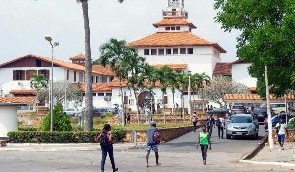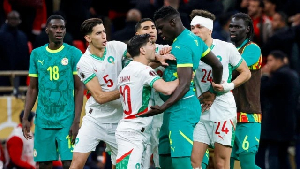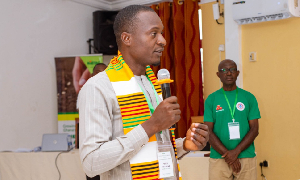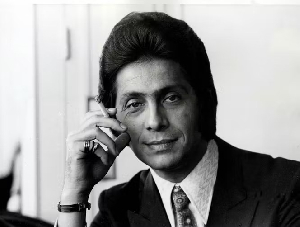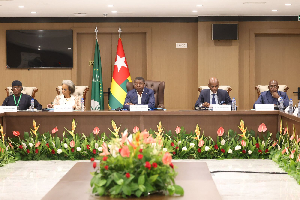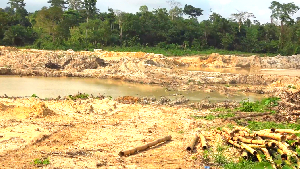On October 4, 2004, the German chapter of the National Democratic Congress (NDC), the main Ghanaian opposition party, held a day-long economic symposium in Frankfurt. The main agenda of the aforementioned event was supposedly ?to reach out to the African Diaspora in Germany, [in order] to discuss issues of relevance to Ghana and Africa,? in general, as well as ?to discuss the economic policies of a future NDC government.? The symposium would have been aptly deemed as benign and evanescent, as it definitely ought to be, except for the brazen temerity of parliamentary minority leader Albin Bagbin in suggesting that the Ghanaian electorate return the NDC to power, on the curious grounds that the Rawlings-led semi-stratocratic party ?had learned from its mistakes and now had a new echelon of young politicians ready to pursue new policies for better governance? (Ghanaweb.com 10/7/04).
Indeed, the preceding assertion might be deemed innocuously amusing, were it not for the great and present danger that its actualization would ineluctably unleash on the Ghanaian electorate. For starters, Mr. Albin Bagbin is not leveling with either his countryfolk or the proverbial international community at large. For come December, the people of Ghana will not be choosing between incumbent president John A. Kufuor and a totally new opposition presidential candidate. Rather, the horse-race for The Castle, the Ghanaian equivalent of the White House, will be between the latter and Professor John Atta-Mills, former Ghanaian vice-president under the two-term Rawlings administration. It is also definite that Mr. Bagbin would be elevated to the coveted status of parliamentary majority leader, or even Speaker of the House, in the highly unlikely event that the NDC is returned to power. And here, we emphasize the fact that it is highly unlikely for the NDC to be returned to the Ghanaian seat of governance largely because the twenty years that the Rawlings administration maintained its stratocratic stranglehold on the country were also, unarguably, the most miserable years in the history of post-colonial Ghana. It is, therefore, heartening to hear Mr. Bagbin talk about the NDC constabulary having learned from its mistakes, and being zealous about charting a wholly new and more constructive tack or approach to public policy. Unfortunately, twenty years of flagitious leadership, involving the summary assassination of Supreme Court judges, as well as random kidnappings, does not leave the NDC with any room by way of public confidence or credibility. If anything at all, the mere mention of the NDC returning to power evokes the same bleak and daunting memories that the mere mention of Hitler?s Third Reich, or the rise of a neo-Nazi movement, does for Jews, particularly those among the latter to whom the Holocaust remains as bitterly and rawly fresh today as it was a half-century ago. And so it comes as quite eerie for many Ghanaians to learn that Mr. Bagbin issued his political come-back threat in Frankfurt, Germany.
It may not be purely coincidental or accidental; for the NDC top constabulary, including Flt.-Lt. Jerry John Rawlings, the former?s swashbuckling patriarch, has during the course of the last three years sworn to rain hell on the Ghanaian electorate, should the latter flatly refuse to return it to power. Indeed, it has only been during the past few weeks that the NDC presidential flag-bearer, Professor John Atta-Mills, has tempered his cynical rhetoric with any modicum of conciliation. It may be recalled that not very long ago, the party?s general-secretary threatened to summarily reduce Ghana into a state of chaos on the infernal order witnessed in such war-torn countries as Sierra Leone, Liberia, Congo and Rwanda. It took several months before Professor Mills came out to publicly condemn his party?s scribe. Interestingly, like his NDC political boss, Dr. Josiah Aryeh is a tenured professor of law at the University of Ghana.
While we have no vested interest in the affairs and fortunes of the Kufuor-led ruling New Patriotic Party (NPP), and thus have no reason to hold brief for the latter, still, it is worth pointing out that during the twenty years that the Rawlings-led National Democratic Congress held political sway, Ghanaians lost their once taken-for-granted access to the nation?s public health and medical facilities. It was not until early this year (2004) that the NPP initiated a comprehensive National Health Insurance Scheme to cater to the medical needs of all the country?s inhabitants, including illegal immigrants. And, curiously enough, the former Gold Coast, ranks near the bottom rung of the poorest countries in the world. Which is largely why it utterly flabbergasts many Ghanaians resident here in the United States to hear President George Bush II callously assert, as he did during the latter?s recent debates with Democratic Party presidential candidate, Senator John Kerry, that the United States, under the watch of the Republican Party, would never be able to guarantee the estimated 45 million American citizens who have no medical insurance with ready access, short of emergency situations, to basic health and medical facilities. Meanwhile, as Senators Kerry and Edwards continue to frankly emphasize, U. S. Congressional representatives, many of whom are multimillionaires, and billionaires, enjoy perhaps the best public-underwritten medical insurance benefits in global history. On this score, Ghana?s National Democratic Congress may be aptly seen to be largely composed of political cynics who privilege their group-welfare over the proverbial commonweal of the polity. For, under the elective watch of the NDC, from 1992 to 2000, nearly 2 billion cedis (approximately $150,000) in hard currency was earmarked for the health coverage of Mr. Rawlings? cabinet appointees (Ghanaweb.com). And so when the NDC coordinator for the latter?s German chapter, Mr. Francis Tamakloe, describes his party as a ?social democratic organization,? the coordinator is either grossly out of touch with his party?s proto-capitalist agenda, or the man simply does not understand what he is talking about, as, indeed, has become glaringly apparent of the top-membership of the NDC.
Perhaps the one sagacious speaker at the Frankfurt symposium of NDC stalwarts was Dr. Nchor, a Ghanaian professor of Engineering at the University of Darmstadt, Germany, who laudably called for the creation and expansion of a continental African railroad network in order to boost commercial and industrial productivity in that economically depressed region of the world. Indeed, had the esteemed professor taken the time to critically examine the dismal record of the NDC government on the development of transportation, he most likely would not have consented to participate in the symposium, unless he needed to use the occasion to beef up his promotion or professional portfolio. It is also quite puerile, if not outright unenlightening, for the NDC parliamentary opposition leader to inveigh against what Mr. Bagbin terms as the ?undue importance? which the NPP government appears to have accorded chieftaincy in Ghanaian national politics. First of all, we need to inform the obviously, crassly imperious and ignorant Mr. Bagbin that the Okyenhene (King of the Akyem) and the Asantehene (Imperial Monarch of the Asante) are no ordinary ?chiefs.? To be certain, the cannibalistic and colonialistic re-designation of these revered traditional leaders as ?chiefs? inaccurately characterizes their noble and pre-eminent roles in the foundation and development of modern Ghana. For without question, the destiny of Ghana over the past 500 years, conservatively speaking, owes much more to the institutional status of the Okyenhene and the Asantehene, whose cognate, or common, royal matrix is the Adanse royal family. His abject arrogance and ignorance may, in part, stem from the fact that Mr. Bagbin is not of Akan extraction and thus his rather intemperate pronouncement being tinged with plain envy; for needless to say, the Nile is to Egypt what the Akan are to Ghana, and nothing, whatsoever, can be done about this stark historical reality.
Having duly recognized the preceding fact, nonetheless, it goes without saying that their historical primacy, vis-?-vis Ghana and the West African sub-region, in no way places the Akan in any unique or special position among their kin and neighbors in the West African sub-region. Still, the imperative need for those who choose to offer themselves for national leadership to respecting our traditional rulers cannot be gainsaid. Maybe politicians like Mr. Bagbin ought to be touring the northern-half of the country, exhorting their kin and fellow citizens to respect their traditional rulers. The recent contract-decapitation of the Ya-Naa, or King of Yendi, definitely leaves an unsavory blot on modern Ghanaian civlization.
But it is also rather curious that the likes of Mr. Bagbin should find in such culturally moorless and rudderless personalities as former President Rawlings legitimate leadership. The latter, needless to say, is a grim reminder of the deleterious effects of European colonial domination. Furthermore, both the Asantehene and the Okyenhene are well-educated and geopolitically enlightened leaders whose ilk ought to have been thoroughly integrated into our national government long ago. And if, as Mr. Bagbin maintains, the Asantehene or, for that matter, the Okyenhene, cannot legitimately be allowed to initiate commercial contracts with the World Bank, then who should? Mr. Rawlings? Indeed, the NDC has yet to fully account for the appropriation of monetary resources solicited from the IMF and World Bank, in the name of Ghana?s national development. Not very long ago, President Rawlings confessed to an august conference of Ghanaian Catholic bishops that he has mired the country in abject corruption. And so for ?Mr. House-cleaning? to be disdainfully charging the NPP government with unprecedented corruption reeks of nothing short of the outright risible. Those who live in glass houses must not throw stones!

Views expressed by the author(s) do not necessarily reflect those of GhanaHomePage.


